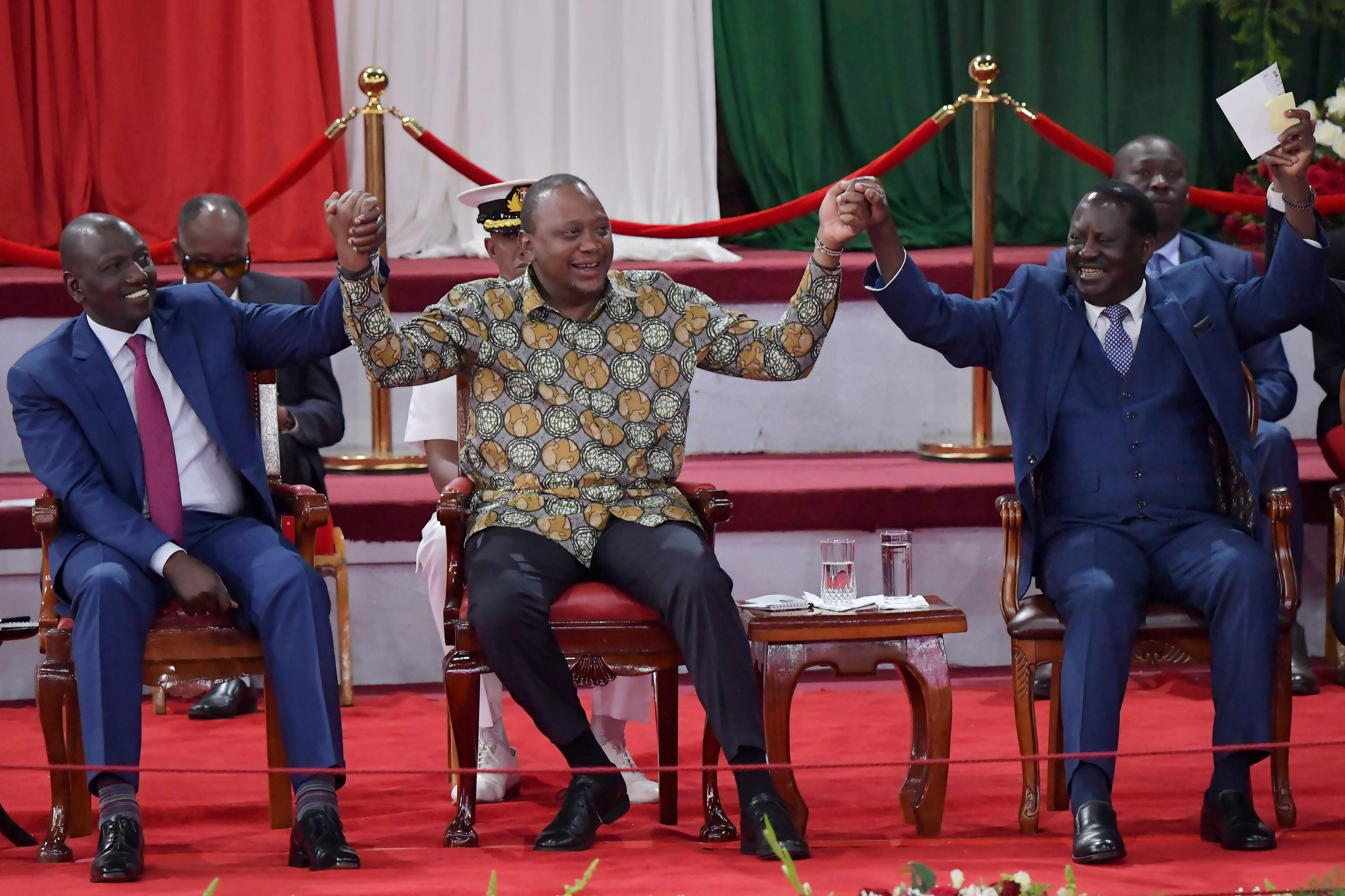Breaking News: At least 10 feared to have drowned in Makueni river
Novel doctrine to determine BBI appeal case

From left: Court of Appeal judges Fatuma Sichale, Patrick Kiage, Roselyn Nambuye, Daniel Musinga, Hannah Okwengu, Gatembu Kairu, and Francis Tuiyott during the hearing of BBI appeals on June 30, 2021.
What you need to know:
- LSK's Nelson Havi described the Constitution proclaimed in 2010 as "a perfect constitution".
- Senator Kithure Kindiki was categorical the BBI Bill was driven by the President in his official capacity.
Lawyers prosecuting the Building Bridges Initiative (BBI) appeal case before the Court of Appeal have set their sights on two controversial concepts the High Court propagated when declaring BBI as unconstitutional. They seek to demolish the so-called Basic Structure doctrine and the "eternity clauses" the trial judges claimed made the Constitution unamendable.
The common thread of arguments from the galaxy of senior counsels and lesser stars was that Wanjiku has the absolute, sovereign right to amend the Constitution in any way she chose irrespective of the crippling obstacles the High Court put in her way. In their view, it was absurd to say the Constitution was unamendable when Chapter 15 contained the specific provisions for its amendment.
The counter-attack from the anti-BBI lawyers was three-pronged. First, the BBI process as carried out was illegal, and that there was no public participation. Second, President Kenyatta abused his office by pushing for the Popular Initiative route while being a state officer. Third, the proposed BBI amendments were an undisguised attempt to overthrow the country's constitutional order. Alas!
Solicitor-General Kennedy Ogeto led the establishment assault by stating simply and unequivocally that the Basic Structure doctrine does not exist in our constitution or jurisprudence. The trial judges picked it from thin air, he intimated. AG Emeritus Githu Muigai, representing the IEBC, added ammunition with his argument that the High Court had peddled personal opinions and theories in the guise of jurispridence.
Senator James Orengo, who appeared for the BBI secretariat, was adamant that a competent ruling should have confined itself strictly to the text of the Constitution. "The High Court wandered into hypotheses and fiction," said the senator.
The presumed immutability of the Constitution was the animating principle of the opposing side. LSK's Nelson Havi described the Constitution proclaimed in 2010 as "a perfect constitution". Of the Basic Structure, he conceded it wasn't there in the text but then suggested it was "implied".
Eternity clauses
Havi, who revels in his verbosity, then went into full flight about antecedents deriving from dead philosphers John Locke and Baron de Montesquieu (who wrote 'Spirit of the Laws'). "What happened to the Independence constitution was a destruction. The Basic Structure of our dominion status was demolished in favour of a centralised Presidency," he intoned.
The irony of defending a dominion status where the Queen of England continued as our Head of State post-independence instead of an indigenous President escaped the voluble Havi completely.
Paul Mwangi, Raila Odinga's lawyer, took the court through the countries with "eternity clauses" in their constitutions, and from which the High Court could have borrowed its Basic Structure idea. He mentioned India, Germany, Turkey and France. However he stressed the nature of those constitutions was shaped by unique aspects of those countries' histories, which Kenya did not share at all.
In France, it was to the post-Revolution Republican character of the State. Attempts to replicate the Basic Structure and "eternity clauses" in Uganda and Tanzania were rejected by the countries' judiciaries, Mwangi noted.
Turkey's example is atypical. From 1928, the country inscribed secularism to be the heart of its "eternal" constitution. That is no longer the case after President Recep Tayyip Erdoğan, a closet Islamist, came to power with a massive popular majority.
The role of President Kenyatta in a process designed to be a Popular Initiative was heavily contested. Senator Kithure Kindiki, appearing for one of the respondents, was categorical the BBI Bill was driven by the President in his official capacity. "His fingerprints are all over. The launch of the BBI Task Force, of the Steering Committee, the notices in the Official Gazette - all were overseen by the President,” he said.
Legislative majority
Kindiki then gave an interesting example of how the President should conduct himself when he dons the hat of a private person other than his official one. He cited the landmark moment in October 2014 when the President temporarily handed over to the Deputy President before travelling to The Hague for his ICC case. "The President said he was going to deal with a personal matter," Kindiki recalled.
There has been plenty of online jokes over the insistence by the BBI secretariat advocates, Orengo and Otiende Omollo, that the promoters of the BBI Bill were secretariat co-chairmen Junet Mohamed and Dennis Waweru. From where I stand, the mirth is not unjustified as everybody had seen the President and Raila lumbering all over the country pushing for BBI.
Otiende, however, brought up an entirely different twist. Even assuming the President was the promoter, he was within his rights as a citizen. There was no law, argued the Senior Counsel, stopping the President exercising those rights to support a Popular Initiative. (In fact, Judge Patrick Kiage did question an opposing advocate on whether the President couldn't opt for this option if, hypothetically, he lacked a legislative majority to buttress a Parliamentary Initiative).
To his credit, the President's lawyer Waweru Gatonye chose to ignore adversaries who sought public attention by getting personal with the President, leaving it to the Bench to note the insolence. The first culprit was Havi. On the President's alleged serial non-compliance with the law, Havi threw a snide remark about England's King Edward VIII's abdication and flight with an American divorcee.
Veteran lawyer John Khaminwa, while comparing the President's tenure to Daniel arap Moi's misrule, insinuated the judges deny the President a hearing.
He also provocatively asked they take note of the situation of former South African President Jacob Zuma, who a court has ordered imprisoned for contempt.
@GitauWarigi





